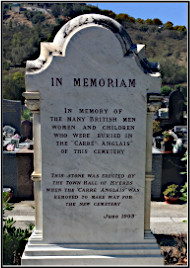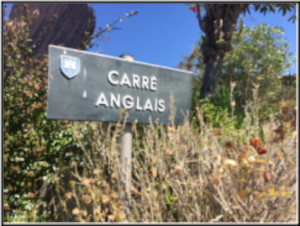Peter Jeffreys is an associate professor of English at Suffolk University, Boston, MA. He has written and edited a number of books on the Modern Greek poet C.P. Cavafy: Eastern Questions: Hellenism and Orientalism in the Writings of E. M. Forster and C. P. Cavafy (2005); The Forster-Cavafy Letters: Friends at a Slight Angle (2009); C.P. Cavafy: Selected Prose Works (2010); Reframing Decadence: C.P. Cavafy’s Imaginary Portraits (2015). He has recently written a new biography of the poet, Alexandrian Sphinx: The Life of C.P. Cavafy (co-authored with Gregory Jusdanis), to be published by Farrar, Straus and Giroux. His occasional ventures into the realm of creative writing include the following poems: “Seraph” (Paradise in Limbo Literary Arts Magazine, 2016); “Arrangement in Black and Gray: After Whistler” (Ergon: Greek American Transnational Arts and Letters, Fall 2017) and “Greek Necropolis” (C.P. Cavafy Forum, University of Michigan, Fall 2018).
Hyères, with its two Saint Pauls
one ancient, Catholic, medieval
the other reformed, Gothically revived
funded by Victorian wealth
attended by a leisured populace
extravagantly bent on sport and pleasure—
tennis, gambling, golf
automobiles, airplanes—
wintering azurely in a blue oblivion.
And you, a third Paul
less sure-footed
more sinner than saint
a self-crowned Prince
(or so you signed yourself)
penning for The Riviera News.
Society gossip
columns propping up rich lives
tossed mere scraps to cover deprivation
the fallen scion of a once
great house of commerce—
Cavafy and Company, Inc.
Casinos, concerts, cotillions
dance cards filled with trivial gavottes
talent in abundance
clogged by debts and regrets.
No family here—your brothers back in Egypt
carry on poetically
one destined for world fame.
Hyères-les-Palmiers becomes your destiny.
Your brother’s poem “The City”
deftly seals your flâneur’s fate:
You said: “I will go hence to another land,
I will betake me to another sea.
A better place than this may well be found.
All my endeavours are foredoomed to fail,
and as though dead my heart is sepulchered.
How long shall this corrosion sap my brain?
On every side—whichever way I look—
dark ruins of my life confront me here
where I have spent and wrecked so many years.”
Yet you manage. This city gives you something.
You fancy its quaint doors
its fine medieval features
you love its purple violets
regal palms and coastal beauty.
Olbia’s Greek ruins lie
beneath the bastide manner-house
you once inhabited in Almanarre
tending to a blind and lame
octogenarian general.
But Olbia’s etymological prosperity escapes you.
Off season, by the summer seashore
local French boys tease you
their lean, taut bodies beckon.
You dare to ogle, boldly
so outré even for you.
Back again at the Hôtel des Hespérides
desperate, living off the hotelier’s pity
no evening goddesses regale you.
That role was taken by Maria Zambaco
your Anglo-Greek compatriot
painted by Burne-Jones in triple triumph.
She hangs sublimely in the V & A—
you hang your soiled linens on the
balcony out back
hoping no one notices
your frayed and squalid life.
There’s no one here to guard your golden apples.
You shall not find new places; other seas
you shall not find. The place shall follow you.
And you shall walk the same familiar streets,
and you shall age in the same neighbourhood,
and whiten in these same houses. Ever this place
shall you arrive at. There is neither ship,
nor road, for you, to bring you otherwhere.
As here, in this small nook, you wrecked your life,
even so you spoilt it over all the earth.
Your final years are spent in loneliness.
Forlorn, you pass away.
No tombstone marks your death.
A common pauper’s grave—
Carré Anglais—
bulldozed decades later
demolished to make room for new French crypts.
Your bones’ location
anybody’s guess—
here, there
anywhere, nowhere
somewhere in Hyères.
Prince Paul—In Pace Requiescat.

The English translation of C.P. Cavafy’s “Η Πόλις/The City” cited here is by the poet’s brother John Cavafy, also a poet, who titled it “The Place” and is reproduced courtesy of the Onassis Foundation Cavafy Archive (Item: GR-OF CA CA-SF01-S04-F12-SF001-0003 (1931), DOI: https://doi.org/10.26256/ca-sf01-s04-f12-sf001-0003).
For other contributions by Peter Jeffreys, please follow the links below:
Poetry in this post: © Peter Jeffreys
Published with the permission of Peter Jeffreys


